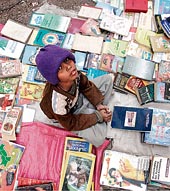|
|
| Still in with a chance |
Advanced computer hardware and high-speed broadband internet connections are now an integral part of the book world. Every reference library is equipped with them; every writer with a computer has broadband connectivity to keep in touch with the literary world. These devices now cost less and newspapers and magazines are becoming redundant in their existing forms. Hence, the question that is being asked is whether books and other print material will be replaced by bytes in the future.
Bill Gates certainly thinks so. Superfast internet connections are already there and Google has begun to post out-of-copyright books on the Net. While reliable sales figures of college-level textbooks are not available, publishers complain that students are already spending less, probably because of rampant photocopying and easy availability of material on the internet. But screen reading is unlikely to replace printed copies soon for three reasons.
Copyright permission is the first big hurdle. Publishers make their money from print material, which could be in the form of a book or an article in a magazine. These have been acquired, produced and marketed by them at some cost. Surrendering copyrights and putting them in the public domain, as it happens with out-of-copyright matter, would put publishers out of business.
As a result, publishers hang on to their rights till the term expires, which is 50 years after the author’s death. And, even in such cases, the estate or the successors of the author will renew the copyright simply by updating the text in case of educational books, or by providing a new introduction to fiction. Copyright is messy but the point here is that publishers will never let go of their copyright. All they would do — and this is already happening — is post a summary of the book, with critical comments, and then seduce the reader to buy the printed stuff. It is rather like the postings of synopses of articles in up-market journals; to read the complete article, you need to subscribe to the journal or pay for the printout of the article. Nothing comes for free.
Second, is screen reading. Not many in their thirties or over have gotten used to it. It requires a different bent of mind, which comes when you are young and pliable.
Marketing of ‘bytes’, especially for the Indian market, is probably the most difficult task, at least in India. How do you demonstrate the software? It is not exactly the same as selling CDs and tapes. The middle class is not ready to buy a product without a proper demonstration and a chance to figure it out themselves. And, even if you have worked out a solution, it is still beyond the reach of many consumers. It is true that the internet has become an indispensable tool for learning and reference. Its importance will increase in the future. But whether it will completely replace printed stuff is another matter.











